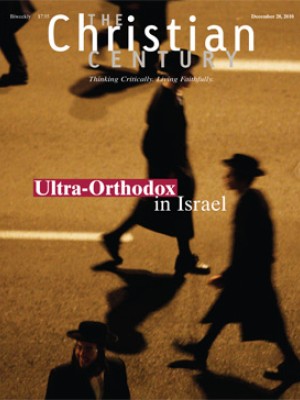Gays in the armed forces: Israelis say ‘no problem’
Israel, like the United States, is a largely secular society with
deep religious roots. And Israel, like the U.S., is home to vocal
religious conservatives who frown on homosexuality. But Israel, unlike
the U.S., has allowed gays and lesbians to serve openly in the military
for 17 years. In fact, they are required to do so. If Israel has found a
way to allow gays in the military, can it provide lessons to the U.S.
as it struggles with whether—and how—to dismantle the "don't ask/don't
tell" policy?
Perhaps. But like everything in Israel, it's a bit more complicated. And the comparison between the U.S. and Israel is inexact.
By
most accounts, Israel's integration of gays into the military has
succeeded, and the Israel Defense Forces (IDF) has reportedly begun to
share its experiences with the U.S. military.
While the Obama
administration continues to wrangle in court over a federal judge's
ruling that declared "don't ask/don't tell" unconstitutional, the
Pentagon has directed military recruiters to start accepting
applications from all qualified potential recruits, regardless of sexual
orientation.
Read our latest issue or browse back issues.
If the courts or Congress overturn the "don't
ask/don't tell" policy, the U.S. will become the 26th nation to fully
integrate gay and straight members of the military, according to the
Palm Center, a think tank at the University of California Santa Barbara.
Aaron
Belkin, the center's director, said full integration has been
successful even in countries engaged in frequent combat, citing Israel,
American's closest ally in the Middle East, as an example. "The lesson
the U.S. military can learn from the Israeli military is there are no
negative consequences" to inclusion, "even when the military is a
battle-tested force like the IDF," Belkin said.
Drafting openly
gay soldiers into the IDF and other military forces "has been highly
successful and has no negative impact on morale, retention, readiness or
overall combat effectiveness," according to a Palm Center report, "Gays
in Foreign Militaries 2010."
Israel has reportedly offered advice
to a commission on repealing the policy. Pentagon spokeswoman Cynthia
Smith declined to go into detail, but hinted that at least some talks
had already occurred.
Israel's transition to full integration of
gays took time and planning. As a nation with mandatory military service
for both men and women and a strong religious ethos that dictates
almost every facet of everyday life, the Israeli government treaded
carefully.
The IDF began placing openly gay soldiers in units as
early as 1983. It took another ten years for full acceptance, following a
1992 parliamentary law on equality. Internal monitoring of gays
continued until 1998.
Only then did homosexuality in the IDF
"became totally a nonissue," said Frances Raday, a professor of
international law at the College of Management Academic Studies in the
city of Rishon Lezion.
Even with the heavy influence that
Israel's ultraconservative religious political parties wield in
parliament, the country has "an extremely liberal stand on
homosexuality," said Raday.
Rabbi David Rosen, the Jerusalem-based
international director of interreligious affairs for the American
Jewish Committee, noted that the same ultra-Orthodox leaders who
regularly decry gay pride parades never tried to exclude openly gay
soldiers from IDF service.
One reason, Rosen theorized, is that
they did not want to open a national debate over who can serve in the
IDF, because ultra-Orthodox seminary students are exempt from military
service—a policy that a majority of Israelis want to cancel.
Religious
Zionists—modern Orthodox Jews who serve in the IDF—have been more
preoccupied with preventing interaction between male and female soldiers
than with the status of gays and lesbians, Rosen said. "This was a
centrally dominant issue in the whole national discourse of religion,
state, security and sexuality the early decades of statehood," Rosen
said, "and even today it hasn't been totally resolved."
One
outcome of the debate was the establishment of National Service, a
voluntary alternative to military duty open to religious young women and
some men, including Arab citizens. Before Israel changed its law, many
gays and lesbians opted for National Service.
Yonatan Gher,
director of the Jerusalem Open House, a prominent Israeli gay rights
group, said the IDF "seeks out" training from gay groups in order to
better serve and integrate the soldiers. "We speak with them regularly,
especially with commanders and educators," Gher said, adding that the
IDF has been "sharing its information" with the Pentagon.
Amit
Lev, who disclosed his homosexuality during a stint in the IDF, believes
that within the proper environment, being gay in the military "can be a
nonissue." He added: "Unlike Israel, in the U.S. no one has to serve
in the army. Those who volunteer, whether they're gay or straight, are
already motivated and will be good soldiers." —RNS





